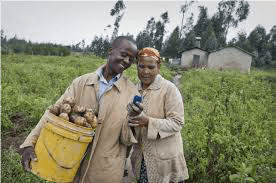There is a growing need among Kenyan farmers to use and implement ICT solutions and innovations to increase productivity while reducing post-harvest losses. The Embassy of the Kingdom of the Netherlands in Nairobi commissioned a study to investigate business opportunities for (Dutch) ICT initiatives and businesses working within the agriculture sector in Kenya. The study gives a thorough insight in developments in the ICT Sector, especially related to agriculture, interesting opportunities and advice on how new companies can enter the market.
Beeld: © Research Digital Farming in Kenya
The development of digital solutions that assists farmers and aggregators in improving their yield and income from agriculture is rising. ‘Providing food security for all, now and in the future’, is a national goal which is embedded in the constitution of Kenya and in its Vision 2030 plans and in the Big 4 Agenda for the coming years.
Existing challenges such as poor agricultural practices, low quality inputs and lack of access to knowledge, credits and markets are exacerbated by new challenges such as climate change, changing pest and disease patterns and changing demographics. Traditional ways to close yield gaps are proven not to be sufficient. A transformation in agriculture is needed in which data that can lead to better and more timely and actionable knowledge will play a major role.
Current state of ICT in Kenya
Digitalization, the use of mobile technology and social media is reshaping the landscape in many sectors. For now agriculture is the least digitized sector in the world. However, the use of Artificial Intelligence and Machine Learning makes it possible to recognize trends and carry out predictive analysis. Currently, data used to understand and improve agricultural practices in Kenya is static, heterogenous and not timely which makes it difficult for farmers to apply it and improve their agricultural practices. A key question is how this knowledge can be shared in an easy and user-friendly way with the 8.6 million farmers in Kenya, of which 81% are smallholder farmers who have less than 1.21 ha of land. With a mobile penetration of over 90%, Kenya is a frontrunner in the uptake of mobile technology in Africa.
" The Kenyan government is recognizing the potential in the use of data and ICT-technologies in agriculture"
The Kenyan government is recognizing the potential in the use of data and ICT-technologies in agriculture. Kenya is the host of the Africa Regional Data Cube and there are important initiatives started such as the creation of a data platform for climate smart agriculture and the weather observatory. In the past years ICT-companies in agriculture developed a number of applications and services have proven their value in Kenyan agriculture today.

Beeld: © Research Digital Farming in Kenya
The study shows the current ICT opportunities for existing and new companies, the study exists of the following:
- An analysis of Dutch ICT-initiatives and ICT-businesses in agriculture operating in Kenya;
- Identification of the needs and gaps of the Kenyan agriculture sector in the area of ICT and the resulting business opportunities;
- Identification of Dutch ICT initiatives in agriculture who could address these gaps;
- An assessment of the business environment for Dutch ICT for Agriculture companies in Kenya as well as the current view of the Kenyan government on Data and ICT-technologies;
- Lessons learned from Dutch ICT for Agriculture companies working in Kenya Agriculture companies
If you are interested in the outcomes of the study you can read the full report here.
For more information about this research or in case of questions for the Agricultural Counsellor feel free to contact us via nai-lnv@minbuza.nl. Also when looking for support when starting new businesses and partnerships which can contribute to improving agricultural productivity in Kenya and Tanzania. For the latest updates follow us on twitter @NLAgriKenya or register for our newsletter by sending an email.
Agriculture team
July 2019